Making a Change to Advance Community Health, Part Three: Shared Community Data Ecosystems
Data sharing allows us to see how social and health factors are related. Just as critically, data sharing can inform policy making to improve equitable health outcomes across the nation. Our latest webinar demonstrates how these simple truths translate into inspiring projects.
Data Across Sectors for Health (DASH) has recently launched the webinar series “Advancing Community Health Through Equitable Data Ecosystems.” Our goal has been to share the DASH data-sharing framework, which is a culmination of years of experience in funding community collaborations and maps out all potential considerations in the work of data sharing.
The first installment of the series, “Building Foundation With Communities,” took place in June, 2022. If you missed the webinar, you can catch up here.
We hosted our second webinar, titled “Shared Community Data Ecosystems,” on July 26, 2022. While the first installment focused on establishing trust with the community that data-sharing efforts are meant to serve, our second webinar showcased two projects from former DASH grantees where community organizations have worked with community members to build out actual data systems.
Stephanie Johnson, DASH Research Project Manager at the Michigan Public Health Institute, noted that “the goal is to continue to share stories that people can wrap their minds around [and] connect to on a personal level, so that they can see that [change] is actually possible.”
In that spirit, there were three main takeaways from this session:
First, it’s essential to appropriately balance the different aspects of gathering data considering that logistical, ethical, and technological considerations quickly come into play the moment we set out to collect information. “Some organizations may still be logging health data in an excel spreadsheet while others may be using more sophisticated technology. A Community Information Exchange (CIE) needs to be adaptable enough to collect data from all surfaces with minimal invasiveness,” said Chad MacLeod who is Director of Product and Communication at HealthInfoNet, Maine’s statewide Health Information Exchange (HIE).
Second, it is critical that we include the community in decision-making, with the final decision placed in the hands of community members. For data-sharing to serve community needs, the community must drive the effort, given how the answer to most questions can be found within the community. For that reason, listening to how community members articulate their needs is a top priority.
Finally, it’s always worth reiterating that an individual’s health is much more than just the sum of their clinical encounters. This is in keeping with the approach which resists the over-medicalization of human well-being. Sharing person-centered information will inevitably lead to a more complete understanding of what contributes to a person’s overall health.
Perhaps the main message of this webinar was the importance of listening to communities in order to make community members participants rather than subjects of data-sharing efforts. In other words, the primary theme of this session may have been the construction of data systems, but the emphasis continued to shift to the communities themselves. To quote the recently published RECoDE report, “Technology isn’t a solution. Nor is data. They are tools that can help drive solutions, but they are meaningless without first considering the human needs.” To realize systems change in a sustainable manner, we have to work with others in a communal spirit.
The last installment of the series on policy in data sharing will take place in September 2022. The goal is to show, through the three webinars sessions, how the DASH framework can lead to attainable, tangible and sustainable systems change. Make sure to follow us on Twitter and LinkedIn, so you don’t miss any future content.
Information about the panelists:
Chad MacLeod, HealthInfoNet
Jeff Brown, Safer Healthcare, LLC
Sarah Taylor, Safer Healthcare, LLC
Jess Maurer, Maine Council on Aging
Milan Chuttani, Vital Village Networks at Boston Medical Center
Resources:
Resource Guide: DASH Framework – Shared Community Data Ecosystems (July 26)
Presentation Slides: DASH Framework – Session II: Shared Community Data Ecosystems (July 26)
Webinar Recording:

